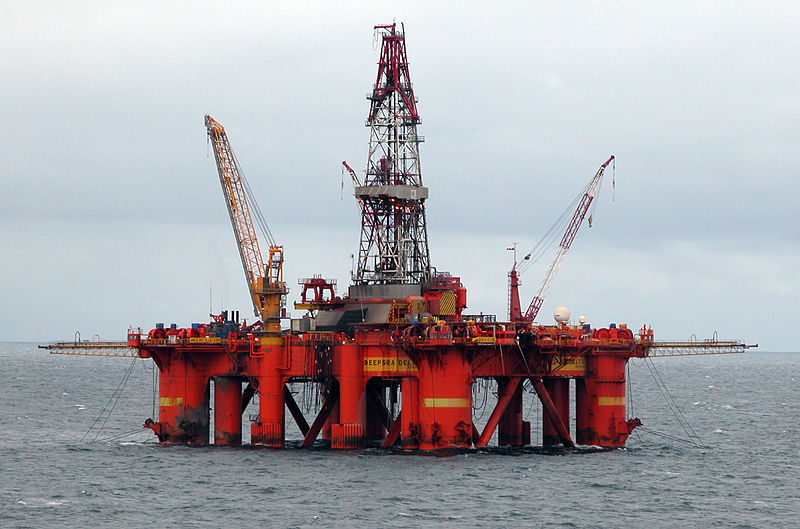By Clément Paule
Translation: Pierre Chabal
Passage au crible n°66
 Source : Wikipedia
Source : Wikipedia
For over a month, the oil giant Total has been trying to stem the gas leak that broke out on March 25th 2012 in the G4 well of the Elgin platform in the North Sea. To this end, the firm is using simultaneously a “dynamic kill” procedure – injection of heavy clogging sludge – and a long-term solution based on two relief wells. Evaluating its daily losses at more than $ 2.5 million, the super major said on 20 April that the volume of gas emission, initially estimated at 200,000 cubic meters per day, had been divided by three. According to officials of the group, the environmental consequences would in addition be limited, which tests conducted by the Scottish Navy partially confirmed early May. This reassuring account was however challenged by the INGO Greenpeace (International Non Governmental Organization), which sent on April 2nd a boat in order to perform sampling near the disaster site. Beyond its immediate impact at the economic level – the business performance and market crude Forties – and at the ecological level, this crisis has revived the controversy over the international risks associated with offshore installations.
> Historical background
> Theoretical framework
> Analysis
> References
For the past three decades, the demand for natural gas has increased steadily and world production has more than doubled. As such, the industry has established itself from the late 1960s in the North Sea, the main hydrocarbon reservoir in Western Europe. However, the decline of mining in this space – a decline of 6% per year on average ; the peak was reached in 2000 – led companies to develop new techniques for exploiting deposits that were less accessible, in extreme conditions of temperature and pressure. Operational in 2001, the Elgin infrastructure was thus presented as a showcase of innovation pushing the boundaries of deepwater drilling. In 2011, investments in the sole UK EEZ (Exclusive Economic Zone) amounted to 8.6 billion euros.
However, technological advances do not outweigh the risk, as recalled by the Piper Alpha disaster occurred in July 1988. In this case, the explosion then the catching fire of this platform operated by Oxy (Occidental Petroleum Corporation) had killed 167 people and caused several billion dollars in damage. We should also mention the numerous anomalies recently exposed on the site of Gullfalks C between November 2009 and May 2010: the report of the Norwegian PSA agency (Petroleum Safety Authority) had then emphasized the failure of security procedures. According to the British Ministry DECC (Department of Energy and Climate Change), these near-accident occur almost daily. Indeed, the Ministry has identified 69 leaks of hydrocarbon or chemical products during the first quarter alone of 2012.
The third company involved in the North Sea – after Shell and BP (formerly British Petroleum) – Total holds the largest stock-exchange capitalization in the euro zone with 93.2 billion euros as of the end of 2011. The group’s share in the Elgin-Franklin field stands at 46.2% and these two fields provide 2% – or 53,000 barrels per day – of its total production. As for Greenpeace, an association founded in 1971 in Canada, it has representations in about forty countries: in 2010, this transnational network counted nearly three million members, including several thousand employees and volunteers – and a budget that relies exclusively on membership fees, amounted to about 225 million euros. If this INGOs is famous for its spectacular actions, lobbying, legal action and expertise are now at the heart of the repertoire of this centralized and professional organization.
1. Non-state management of a limited crisis. The post-accident arena is mostly invested by private actors, while the British authorities remain behind. This configuration facilitated the exercise in communication by Total, however challenged by the militant deployment of Greenpeace.
2. Regional regulation of the offshore sector. This accident has contributed to the intensification of the controversy over the intervention of the EU (European Union) in the regulation of the operations in the North Sea. Supported by environmental INGOs and some MEPs, this project – suggesting increased constraints on oil and gas activities – is strongly opposed by industry.
From 28 March 2012 already, Greenpeace condemned the multinational firm, citing the precedent of the Deepwater Horizon disaster involving BP in 2010. Also, the mobilization of INGOs focused on challenging the monopoly of the diagnosis by very managers of the incident, in this case Total and experts of the Wild Well Control Company. But this process of stigmatization has not led to an economic collapse of the firm, despite the melting of the initial market capitalization of the giant firm, whose stock exchange share still went down by 8% between March 25 and April 8, 2012. Total seems to have mitigated the impact of the gas leak by developing a crisis communication based on the control of information. The absence of victims and of an oil slick as well as the alleged low impact at the environmental level and the tacit support of the British and Scottish governments, in this respect, played in favor of the operator of Elgin. Note that the CFO of Total quickly addressed shareholders by announcing that the event did not alter its dividend policy, based on profits estimated at $ 12 billion for 2011. This shows the ambiguous relationship between the degradation of the image of the company – worsened in April 2012 by another accident in Nigeria and by the aftermath of the Erika case – and the market reaction. The main brokers – including Exane BNP Paribas, Credit Suisse and HSBC – thus remained neutral or moderately optimistic about the group’s performance, especially since the group’s insurance should cover damage up to a billion dollars.
Total seems relatively untouched by the disaster. However, the entire sector is facing renewed criticism from NGOs – from Greenpeace first and foremost – and MEPs who advocate a more stringent regulation of offshore operations in the North Sea. Structured on a national basis, the current system relies on cooperation between the regulatory authority of the state – like the HSE (Health and Safety Executive) in the UK -, industry and unions. Despite reform following the Piper Alpha disaster, this organization has been accused of perpetuating failure and promoting some collusion between the various stakeholders. In 2010, the European Commissioner for Energy had even declared in favor of monitoring the inspectors accompanied by a moratorium on drilling in deep water. However, the proposed regulatory initiative formulated by the Commission in October 2011 mainly focused on the standardization of procedures and stricter conditions for obtaining new licenses, which could now include financial cover for any accident. According to the Fitch Ratings agency, the amount of risk provisions could reach 10 billion euros, which would not be without effect on the ratings of companies operating in the North Sea. These measures have thus met with widespread opposition, from the industry – the 200 companies represented by the Oil & Gas UK – to the labor unions – RMT (National Union of Rail, Maritime and Transport Workers) and Unite the Union – including the British government. Emphasizing the quality of their standards, these actors denounce the transfer of this competence to a new entity devoid of experience, at the expense of a pragmatic and concerted approach within the sector.
Clearly, the mobilization of Greenpeace in connection with the Elgin leak ascribes to its global campaign Go Beyond Oil, directed particularly against the risks induced by investment projects in the Arctic. Based on a report by the insurance company Lloyd’s, the environmental contractor denounced the rush to the North Pole, symbolized by the SDAG project (Shtokman Development AG). Remember also that the IEA (International Energy Agency) fears further accidents in the wake of the disengagement of oil companies from the production in the North Sea. The cost of decommissioning the 500 platforms and 8000 wells in that maritime space could reach $ 100 billion, as estimated by Douglas-Westwood and Deloitte Petroleum Services. These represent as many aspects hidden by the technological race to exploitation, driven by a highly competitive market with State support. These alternative expert figures indicate that the regulation of offshore extraction seems more structured by financial logic and by insurance company interests than directed at the preservation of global public goods.
Ravignan Antoine de, « Greenpeace, entre contestation et négociation », L’Economie politique, (18), 2003, pp. 86-96.
Greenpeace International, Annual Report 2010, consultable à l’adresse web :http://www.greenpeace.org [April 25th 2012].
Lloyd’s & Chatham House, Arctic Opening: Opportunity and Risk in the High North, 2012.
Site de Total consacré à l’incident : http://www.elgin.total.com/elgin [1er mai 2012].




